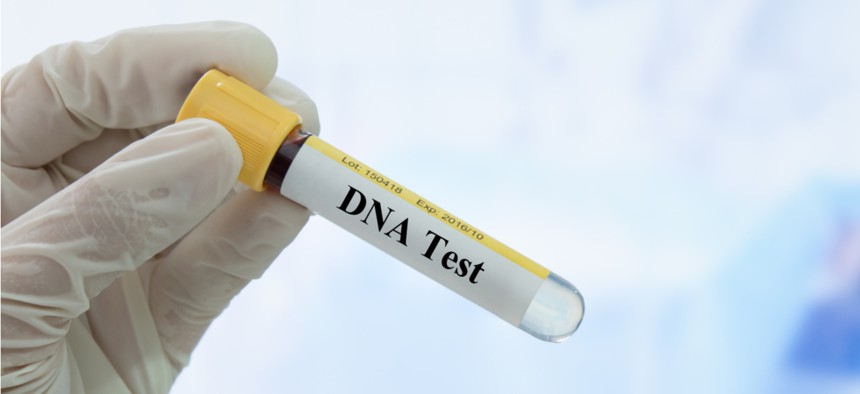
Shutterstock.com
The Holiday Gifts That Could Get Feds In Trouble
Think twice about genetic testing kits and products derived from the cannabis plant.
If you found CBD oil or a DNA screening kit in your stocking and you happen to have a security clearance you may want to check out the return policy. Despite its widespread popularity, CBD, a chemical compound of marijuana, is banned for service members. Security clearance holders, particularly those subject to random drug testing, should tread carefully before using such products. And just in time for the holidays, the Defense Department issued a warning about commercial DNA testing kits.
Who Owns Your Health Data?
Are there security risks to taking a DNA sample and sending it to a private company for screening? The Pentagon seems to think so. In a Dec. 20 memo, Joseph Kernan, undersecretary of Defense for intelligence, and James Stewart, assistant secretary of defense for manpower, urged servicemembers to use caution when providing their genetic information.
“Exposing sensitive genetic information to outside parties poses personal and operational risks to service members,” the memo stated. It goes on to note the unregulated nature of the industries, and the fact that personal information could be made available to third parties. There are privacy concerns, but also personal health concerns. With some genetic screening kits providing health information along with genealogy services, the Pentagon argues there are career implications if a service member discovers a personal—and reportable—health condition through a DNA screening company.
The memo doesn't constitute a ban on using those services but it does urge caution. It reminds service members that the information they provide to a third party—and anything that third party then finds—is certainly not personal information anymore.
“I agree with the warning and would avoid the DNA kits for those concerned for their privacy,” noted Christopher Burgess, a 30-year veteran of the CIA, privacy and security advocate, and regular ClearanceJobs.com contributor. The DNA testing services started out with noble goals, but they quickly found that they could sell the information, said Burgess. “Aggregated or not, it has to reside somewhere non-aggregated and who is protecting that information?”
Many called out the Defense Department for being late to the party—commercial DNA testing kits have been around for years. The memo may be a response to recent corporate marketing campaigns that appear to target service members with discounted rates. Taking advantage of a government discount gives third party DNA testing kits another layer of information outside of your personal health information and it may not be wise to add military status or government employee to your personal DNA data.
“Members of the Armed Forces—indeed, all security clearance holders—would be wise to heed DoD's warning against the use of recreational DNA testing kits,” advised security clearance attorney Sean Bigley, a partner at Bigley-Ranish. “Privacy and non-discrimination laws haven't yet caught up to this new frontier in entrepreneurial science. Until they do, anyone taking an at-home test is entrusting their most sensitive personal information to a private company whose only obligations to the consumer are what they dictate in their fine print.”
Bigley noted the issue is that few individuals actually read the fine print, and therefore don’t know where their genetic data could end up. The lack of clear privacy and non-discrimination law relative to the DNA kits also means the information could be used to discriminate based on genetic history or health data, a specific concern cited by DoD. Consumers also face little legal recourse if the data is hacked by malicious actors or even legally purchased by foreign entities.
Is CBD Oil Off Limits for Security Clearance Holders?
Here's the rub: most issues in security clearance determinations are far from black and white, and that is especially true of CBD oil. After President Trump signed the Farm Bill in March, many people incorrectly assumed the law made all CBD products fully legal. The reality is the Farm Bill simply paved the way for government regulation of CBD products, and established criteria and legal limits of THC in hemp products. Unfortunately, the average CBD product you purchase (you know, at your local gas station or strip mall), is likely not under an FDA pilot, and therefore buyer beware.
The Farm Bill legalized hemp products, defined as those with a THC concentration of .3% or less. Anything higher is considered marijuana. The issue is many products don’t list their THC concentrations. If your livelihood depends upon keeping a clearance, and you have any uncertainty about the THC levels of the products you're using (some products come with testing information), proceed with caution. If you take a drug test and you fail it you may not get a pass because you were using what you assumed was a “legal” product. Your chances of successfully overcoming a failed drug test are infinitely higher if you can show you did due diligence by purchasing a reputable product, with clearly listed ingredients and a THC concentration that falls within the Farm Bill guideline.
The bottom line is: Be a smart consumer. In a world where people are quick to give up privacy for information, or seek an easy fix to a health problem, officials are saying hold up. Think twice about ingesting substances you don’t know or mailing your most personal data to a company whose policies you don’t understand.
Just because something is allowable doesn’t mean it’s advisable.






